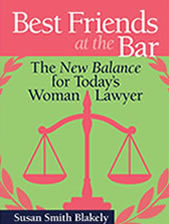Client development is the single most important requirement for your success in the law. You have heard it from me before, and you will hear it again. It seems to be at the bottom of most of the dilemmas and career disappointments that I hear from women lawyers today. Women lawyers, both young and older, are finding out at different points in their careers just how important client development is—-or was.
Having your own clients gives you independence, and independence is what protects your job security. If you have developed your own clients and can walk out the door with them, the invitation to walk out the door—the pink slip or RIF—-may never come—- or your decision to try something different than your law firm will be an easier one to make. You have developed something of value by having clients that are loyal to you, and that loyalty is apparent to everyone around you. Ushering you out the door is inviting clients to go with you and affects law firm profits. That is never a good thing for a law firm.
Why am I harping on this again? Two reasons. First of all, I was recently in a conversation with a woman lawyer, who felt helpless at the end of her career because she had no personal clients and her law firm was shutting down. This is a real dilemma, and you do not want to risk it happening to you. It is the result of Old Rules vs. New Rules, and it is not clear at all that any of us should have seen it coming.
It is no longer enough to be “the best lawyer you can be.” Under the New Rules, you now must be “the saviest best lawyer you can be.” Today, it is simply not enough to sit in an office for most of your career doing really good work for other people’s clients. What worked 15 years ago does not work any more. Here’s why.
Years ago law firms were structured in a way that fulfilled the expectation that the top dogs at the law firms get the clients, have younger lawyers work on client matters, and eventually pass the work down to those younger lawyers when the top dogs retired. Sounds simple. And, it worked pretty well for a lot of years because the top dogs who had the work were able to keep the work, and then they retired and passed the work on.
However, enter competition—the kind of competition that pitted law firms against other law firms bidding for the same client work. It was competition like our profession had never experienced before. Add to that the economic downturn where potential clients were holding back on expenditures for legal services, and the top dogs did not want to share their clients with other lawyers. Suddenly they needed all the billable hours they could muster to justify top salaries in the not-so-great economic time.
Are you beginning to see the problem? Now consider that many of the top dog baby boomer lawyers have not been retiring during the recession, and not as much work is flowing downhill to the mid-level partners. As I am sure you recognize by now, this is a real problem for the mid-level and younger lawyers who do not have their own clients and are not inheriting them as readily as in days gone by.
So, be smart. Be savvy. Get out of your cubicle and sharpen your client development skills. If you do not have those skills at all, find a mentor who can help you learn them. Be creative. Look for clients in your professional life and in your personal life. Get involved with bar associations, where you can develop relationships with lawyers who will give you conflict work, and get involved in the trade associations and other industry groups where the clients you want hang out. Although you will have to do much of this before and after your typical workday, you must find some way to do it.
And don’t forget the development opportunities in your personal life. Never overlook an opportunity to talk to your friends about legal services they might need, and consider every person you meet in your personal life a potential client. Read my books and find out how to do that without offending everyone and losing your friends. It is possible, and it is critical to your future independence as a lawyer.
Here’s the second thing that got me thinking about all of this again. An article in Salon.com on March 23rd really got my attention. That article, “Can Women Over 50 “Lean In”? addressed the problems for women either trying to re-enter the workforce after having children or women who cut back on their workload and are trying to ramp up again. The author points out that “leaning in”, as advised by Sheryl Sandberg, does not work for women in those situations for a variety of reasons, including a disconnect with business and skills during the hiatus period and what really amounts to veiled age discrimination.
Although the article is not specific to women lawyers, I could not help but think of women lawyers when I read it. One thought kept coming back to me: Wouldn’t it be easier for those women lawyers over 50 to find their places in the workforce if they had paid more attention to gaining and retaining clients during their earlier careers? Unfortunately, many of these women practiced under the Old Rules and could not have anticipated this rule change. I sympathize with their situations, and I wish I had better answers for them. We all have seen huge paradigm shifts in the economy and in business in recent years, and this is just another one of them. Past as prologue, learn from it and don’t forget what you learn.
Job security. That is what it is all about and why client development is and will be so important to all of you. Protect your future. Client development is like putting money in the bank. It just makes sense, and it can make a huge difference in how your career unfolds.
And that is why I keep talking about it.













